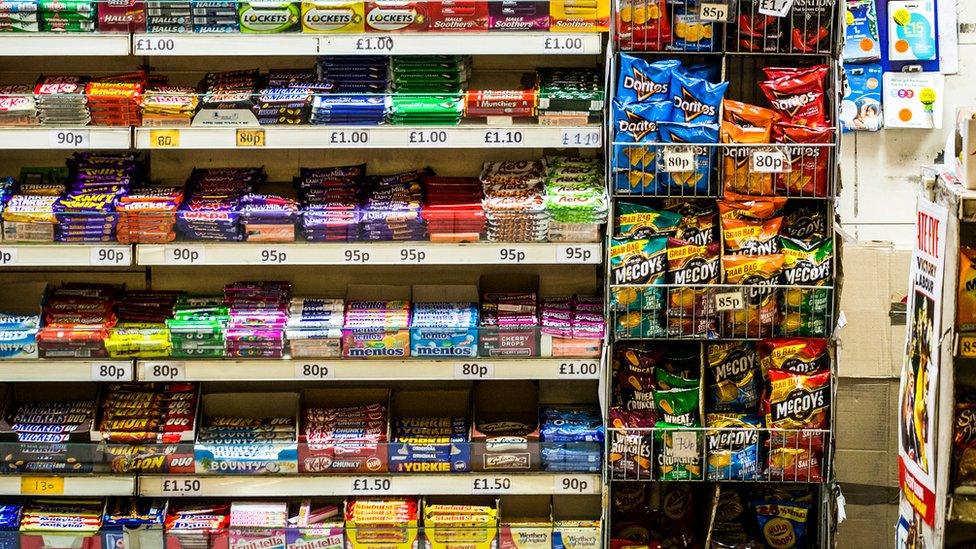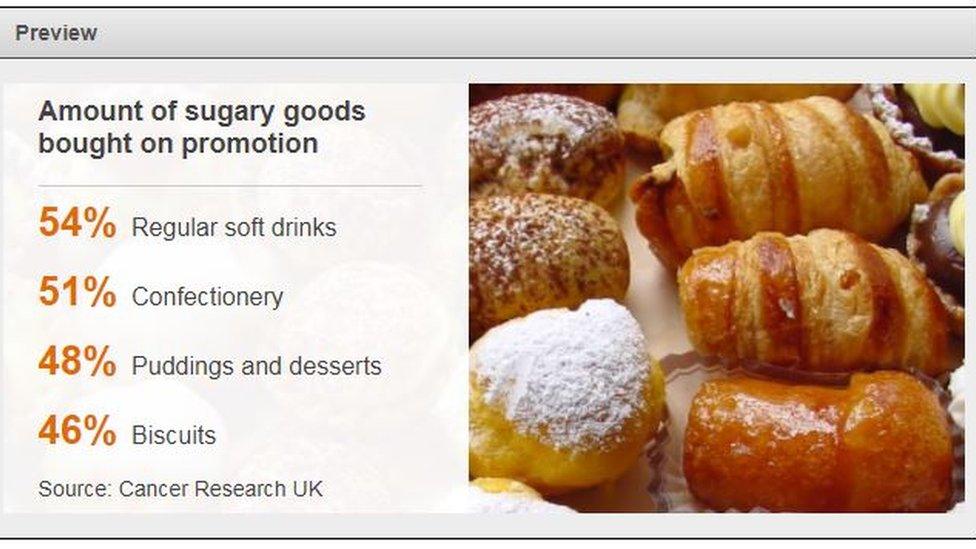Sweet multi-buys trigger sugar warning
- Published
- comments

Cancer Research UK wants curbs on promotions of sugar-rich food
Scots buy junk food containing 110 tonnes of sugar a day on special offer deals, Cancer Research UK has said.
The charity said that equated to 4.3 million chocolate bars or three million cans of cola.
It has called for new laws to limit promotions of sugar-rich junk food, which it said accounted for about 40% of food expenditure in Scottish homes.
The Scottish government said it was engaging with retailers on action to offer healthier choices.
The UK government's department of health described current advertising restrictions on junk food as "among the toughest in the world".
Cancer Research UK said Scotland was in the grip of an obesity epidemic and that 13 types of cancer, including bowel, breast and pancreatic, were linked to a person's weight.
The charity had publicised figures in March which showed that a third of Scots ate confectionary at least once a day.
It has now warned that more than half of regular soft drinks (54%) and confectionery (51%) bought were on offer, while 48% of puddings and desserts, 46% of biscuits and 38% of cakes and pastries purchased were also sold at a discounted price.
Over the course of a year, the charity said that Scots bought cut-price soft drinks containing 13,672 tonnes of sugar and sweets containing 12,336 tonnes.
When biscuits, cakes, pastries and puddings were included, the overall total increased to about 39,700 tonnes, Cancer Research UK calculated - the equivalent of about 760 tonnes a week or 109 tonnes a day.
According to the latest figures, about 65% of Scottish adults are overweight while 28% of children were termed as overweight or obese.

The charity's prevention expert, Prof Linda Bauld, who is based at the University of Stirling, said: "Obesity is the unpalatable cost of the cheap deals routinely served up in our shops.
"It leaves a bad taste to know such an enormous amount of discounted sugar is lining our stomachs and weighing so heavily on the nation's health."
Prof Bauld, who said following the publication of the figures in March that the Scottish government "can and must do more" has reiterated her call for urgent action to prevent thousands of cancers in future.
She said: "When it publishes its obesity strategy, the Scottish government has a once-in-a-generation opportunity to introduce measures that will have a profound impact on our lives.
'Children's exposure'
"We know that less healthy foods and drinks are more likely to be bought on promotion than healthier foods and anyone who regularly navigates the aisles knows how hard offers on junk food are to resist."
Obesity Action Scotland said it was "sobering to learn that price promotions are luring Scots to consume so much sugary junk food every day".
A spokeswoman added: "As 65% of Scots are overweight or obese, any action to improve our diets is urgently needed."
The Scottish government said tackling obesity was a top priority and that they were "absolutely committed" to reducing the deeply ingrained health inequalities that persisted in Scotland.
A government spokeswoman said: "The Scottish government continues to engage with the food and drink industry on action to offer healthier choices, including rebalancing promotions and reducing added sugar.

The Scottish government called for a ban on junk food advertising before the 21:00 watershed
"We recognise the need to shift the emphasis from dealing with the consequences of a poor diet to tackling the underlying causes, which is why we have consistently called on the UK government to ban junk food advertising before the 9pm watershed, a move we believe would greatly reduce children's exposure to the marketing of unhealthy food and drink."
A Department of Health spokeswoman added: "Current advertising restrictions in the UK on junk food are among the toughest in the world, including a ban on advertising junk food in children's media.
"We are absolutely committed to tackling childhood obesity and supporting people to make healthy choices.
"Over the past year we have made substantial progress; introducing a world-leading soft drinks industry levy, and publishing sugar reduction targets that aim to cut 20% of the sugar people consume from popular food products by 2020.
'Simpler pricing'
"In addition, many leading household brands have announced they are lowering, or have already lowered, the amount of sugar in their products."
The Scottish Retail Consortium said that, overall, the number of products being promoted by stores was falling in response to customer demands for simpler pricing.
Director David Lonsdale added: "Retailers will continue their efforts to give customers healthier choices, and we do not oppose proportionate measures from government which encourage that.
"However, any measures need to engage with the whole food and drink industry to create a level playing field, so that consumers have the same healthy options and information regardless of where they buy or indeed consume their food."